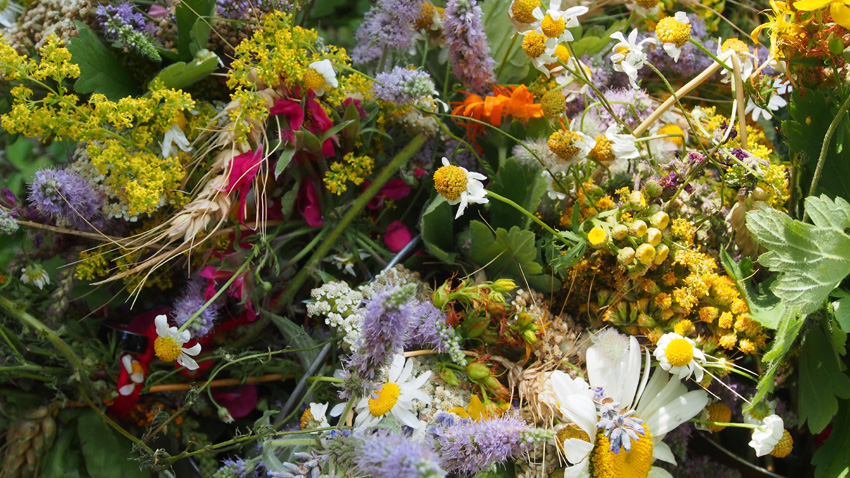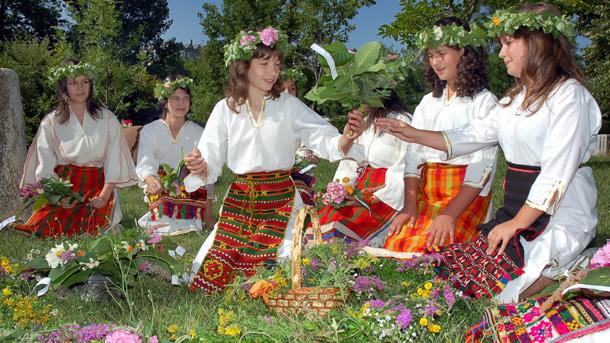Enyovden is celebrated on 24 June, the day when the Orthodox Church marks the birth of St. John the Baptist. In popular beliefs on this day the sun reaches the ultimate point of its journey from the winter to the summer. Now it embarks on the journey back but before that it stops for a while and takes a decent rest, bathes in life-giving water and bids goodbye to the places it will see a year later. On Enyovden the sun, washed and rejuvenated, rises very early and dances from joy. It is good to sight the dance believed to bring health and prosperity at this magic hour.
 As is known on Enyovden water and herbs have particularly strong healing properties. It is claimed that on this day water gushes out even from dried out springs. And herbs picked before sunrise have the power to heal any disease. Herbalists and healers know exactly how to treat diseases that are 77 and ½ in all, according to traditional notions. This ½ disease has no name and there is no remedy for it. On Enyovden 77 herbs are picked and stored. Then herbalists close their eyes and tear the upper part of one of the shoots. This small herb part is then endowed with the strongest power to cure disease. These 77 ½ herbs are made into a posy used to cure humans and livestock during the year ahead. Enyovden has various names in different regions including Ivan Herb Picker, Yanevden, Ivan of the Summer, Midsummer and others. Folk songs have been preserved in various corners of Bulgaria dedicated to this feast. They recount of the rituals performed with care on this day - going out for herb picking, making the Enyovden wreaths and posies. Some of the songs tell the story of how the day's patron Enyo (Yanyo) was about to go for herb picking, but his mother stopped him - the girls had already picked all herbs, made infusions with them and washed their hair.
As is known on Enyovden water and herbs have particularly strong healing properties. It is claimed that on this day water gushes out even from dried out springs. And herbs picked before sunrise have the power to heal any disease. Herbalists and healers know exactly how to treat diseases that are 77 and ½ in all, according to traditional notions. This ½ disease has no name and there is no remedy for it. On Enyovden 77 herbs are picked and stored. Then herbalists close their eyes and tear the upper part of one of the shoots. This small herb part is then endowed with the strongest power to cure disease. These 77 ½ herbs are made into a posy used to cure humans and livestock during the year ahead. Enyovden has various names in different regions including Ivan Herb Picker, Yanevden, Ivan of the Summer, Midsummer and others. Folk songs have been preserved in various corners of Bulgaria dedicated to this feast. They recount of the rituals performed with care on this day - going out for herb picking, making the Enyovden wreaths and posies. Some of the songs tell the story of how the day's patron Enyo (Yanyo) was about to go for herb picking, but his mother stopped him - the girls had already picked all herbs, made infusions with them and washed their hair.  Until the early 20 c. the ritual of Enyova Bulya (Enyo's bride) named after a mythical creature which is a central character in girls' rituals, was preserved and performed. A little girl with parents alive was nominated for this function and was dressed up in a traditional wedding costume. While the Enyova Bulya was being dressed she should not touch the ground. So she was carried around, or sat in the lap of one of the girls who dressed her. Together with the Enyova Bulya the girls toured the village. They stopped at every single house, every well or fountain to sing songs and dance traditional dances. Then they went on to the river, the farming fields and the vineyards. Then they returned to the house where they had started. This symbolical circle of the girl's tour with the mythical Enyova Bulya protected the village and its community and catered for fertility and prosperity.
Until the early 20 c. the ritual of Enyova Bulya (Enyo's bride) named after a mythical creature which is a central character in girls' rituals, was preserved and performed. A little girl with parents alive was nominated for this function and was dressed up in a traditional wedding costume. While the Enyova Bulya was being dressed she should not touch the ground. So she was carried around, or sat in the lap of one of the girls who dressed her. Together with the Enyova Bulya the girls toured the village. They stopped at every single house, every well or fountain to sing songs and dance traditional dances. Then they went on to the river, the farming fields and the vineyards. Then they returned to the house where they had started. This symbolical circle of the girl's tour with the mythical Enyova Bulya protected the village and its community and catered for fertility and prosperity.
 The second part of the ritual was naming posies and divination for love and marriage. On the eve of Enyovden girls gathered together their posies. They put them into a new bowl with water. Enyova Bulya took every posy out of the water for the ritual of divination. In some regions girls practiced the ritual of divination using swap hooks instead of posies.
The second part of the ritual was naming posies and divination for love and marriage. On the eve of Enyovden girls gathered together their posies. They put them into a new bowl with water. Enyova Bulya took every posy out of the water for the ritual of divination. In some regions girls practiced the ritual of divination using swap hooks instead of posies.
On Enyovden divination for health was practiced based on a man's shadow. Also, fires were made on hills and pinnacles, a ritual analogous to the “heavenly fire”. On the night before the feast vagabonds would go around the fields to steal other people's fertility. The cuckoo, the bringer of spring, cuckooed only until Enyovden because it is then that the summer would leave. In some parts of the country people would make new fire and bring it out to all fireplaces in the locality.
English Daniela Konstantinova
The audio contains the following folk songs dedicated to Enyovden:
1. Mari Mome, Malka Mome (My Dear Young Girl) performed by Slavi Boychev
2. Oi Enyo (Ah, Enyo) performed by a women's vocal group from the region of Yambol
3. Ya, oy ta tebe Enyova Bulya (What About You Enyova Bulya) sung by a women's vocal group from the village of Golyamo Krushevo in the Yambol region
4. Oy Enyo, Enyova Mama (Oh, Enyo and Enyo's Mother) sung by a women's vocal group from the village of Prilep in the Burgas region
5. Oy Velo, Velo (Ah, Vela Girl) performed by Ivan Georgiev